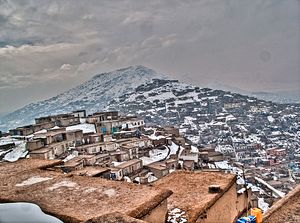The Afghan government and Hezb-i-Islami Afghanistan (HIA), one of the warring parties in the Afghan conflict, signed a peace deal in September last year. The deal was considered as a breakthrough for the Afghan administration led by President Ashraf Ghani. I wrote a detailed piece on the peace deal as it was signed, but since then the process of implementation has been delayed with no specific reasons while Hezbi-i-Islami accuses the Afghan government for not complying with the promises it made.
Most conflicts of this sort share many things in common by having internal and external dynamics. Similarly, the root causes of the Afghan conflict are not only internal, but also encompass the diverse interests of regional stakeholders that have exacerbated matters. Dating back decades, it is quite clear that many state and non-state actors pursue their interests through fear and sometimes as a result of others’ ulterior motives as peace may not be in their best interests as they thrive on conflict. The same is the case with Afghanistan. The deal between HIA and the Afghan government seems to be the victim of the competing interests of diverse actors.
Initially there were reports that Russia and Iran had concerns against the move to de-list HIA leader Gulbuddin Hekmatyar from the UN blacklist, but the Afghan government succeeded in convincing its international partners to de-list Hekmatyar. However, HIA says that some of its demands are yet to be met. HIA had handed over a list of prisoners to the Afghan government to release that had been detained in different parts of the country. It has also asked the Afghan government to provide land to refugees that are living in a headquarters and operations center known as Shamshato, located on the outskirts of Peshawar in Pakistan.
Despite HIA’s involvement in the brutal civil war in the 1990s, the deal is of immense importance, not only for the government and HIA, but to achieving durable peace in Afghanistan. Unlike other political parties in the country, HIA is known as one of the largest and most inclusive parties in Afghanistan. The party’s support lies in the south, southeastern, and northern parts of the country. HIA is comprised of some individuals that have a tendency towards democratic norms and values. Their mainstreaming into political system will have salutary impacts over the political spectrum of Afghanistan. It will spur a political and democratic environment between HIA and other parties such as Jamiat, Afghan Millat, Junbish, Hezbi Wadat, and other political parties, which is of great importance to Afghanistan’s longer term political stability. Viewed this way, parties will craft inclusive strategies and manifestos during future elections that answer the need of the locals.
Countries like Afghanistan are left with very little room for errors and the slightest error can thrust the country into calamitous situations. Similarly, if the Afghan government and international community fail to implement this peace deal, it will portend the failure of peaceful and democratic Afghanistan and will cause negative repercussions in the long run. This is doubly true because the Taliban, the major armed opposition group, is vigilantly watching the government to see how it proceeds with the deal it had signed with the HIA.
Peace may not matter much to external powers, but it does matter to the 30 million people living in this land. These 40 years of continuous war have exhausted the entire nation and brought devastation, killing millions of people. The effects of this long conflict on the Afghan people are myriad.
This is a golden opportunity with both the established and unestablished elite of Kabul to throw their support behind the government and help make the deal between HIA and Afghan government a success. A failure of the deal will not only kill any hope for a future peace deal with the Taliban, but will push Afghanistan towards more chaos and instability.
Aziz Amin Ahmadzai writes on political and security in South Asia and Middle East. He is a Chevening Scholar and former Afghan government official. He tweets at @azizamin786.

































